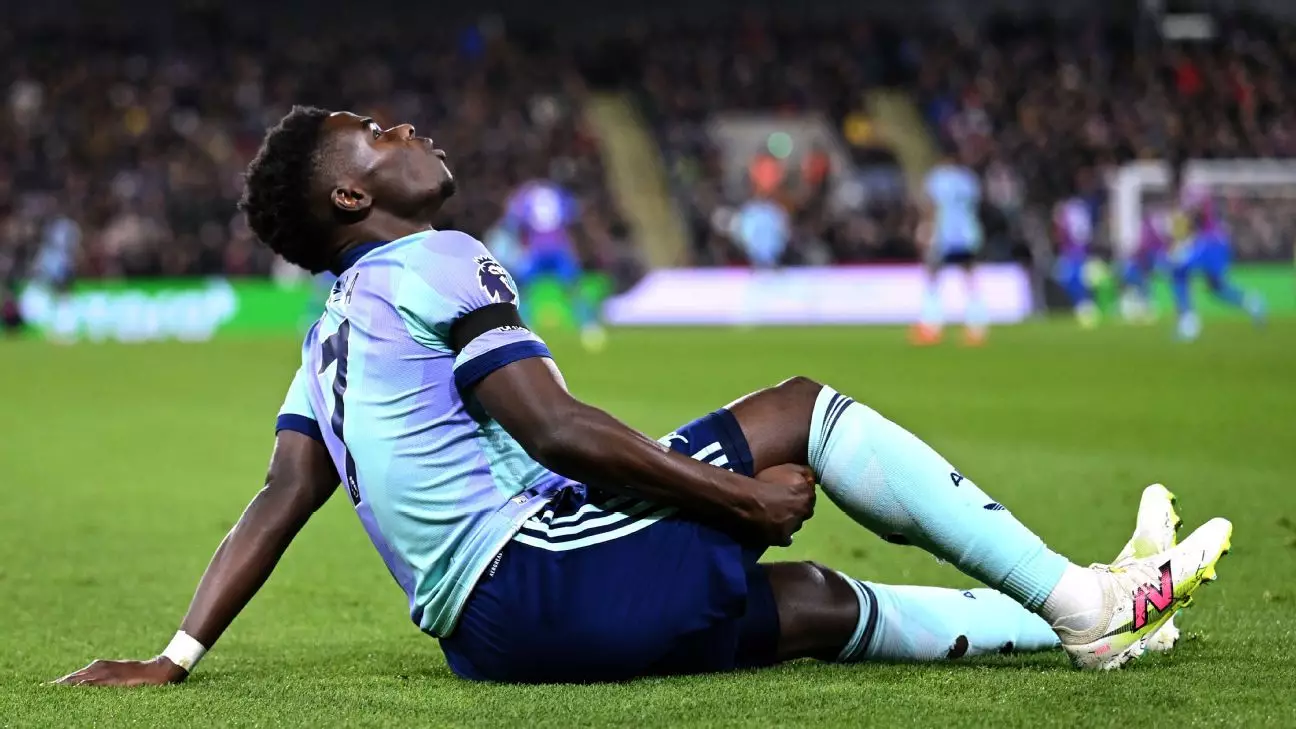In the world of football, injuries often play a pivotal role in determining the trajectory of a team’s season. Arsenal currently finds itself grappling with a significant setback following the recent injury to their star winger, Bukayo Saka. Head coach Mikel Arteta’s announcement that Saka will be out for “many weeks” due to a torn hamstring has sent waves of concern through the club and its supporters. This development has far-reaching implications for Arsenal, and it raises critical questions about squad depth and adaptability in the face of adversity.
An Emotional Toll on a Young Player
The psychological impact of injuries on players, particularly young talents like Saka, is often underappreciated. At just 23 years old, Saka has already emerged as a central figure in Arsenal’s setup, showcasing immense skill and influence on the pitch. After being informed about the severity of his injury by a specialist, Saka left the stadium on crutches, visibly distraught. Arteta’s comments confirmed what many already knew: the emotional weight of such news can be heavy for a player who has built a significant role within the team. “He was gutted,” Arteta remarked, underscoring the importance of providing support to Saka during his recovery.
For young athletes, dealing with injuries is not merely a physical battle; it’s a test of their mental fortitude. As Saka embarks on the road to recovery, it will be crucial for the club to rally around him, cultivating a supportive environment that enables him to maintain his spirits and focus on rehabilitation. The dynamics within the dressing room will inevitably shift, and Arteta’s challenge will be to channel Saka’s energy in a way that fosters unity and perseverance among the squad.
The immediate fallout from Saka’s injury forces Arsenal to reconsider their tactics as they prepare for upcoming fixtures. Arteta acknowledged the necessity for innovation and adaptation, stating that this situation acts as another opportunity for the team to explore effective solutions. “It’s going to be a really good exercise for us to think of ways to overcome another challenge,” Arteta commented, indicating that challenges also open avenues for discovery and growth within the team.
However, the situation is exacerbated by Raheem Sterling’s knee injury, which deprives the Gunners of further options in their attacking arsenal. The absence of both key players raises a stark question about the squad’s depth. Arteta expressed confidence in exploring alternatives within the team, but the challenge remains formidable. How will Arsenal adjust its tactics to compensate for the loss of such influential figures?
Injuries often lead to discussions about the adequacy of a squad’s depth, particularly when two pivotal players are sidelined concurently. Arsenal’s response to this adversity may hinge on the strength of its bench and the versatility of its remaining players. Fortunately, Arteta has stated that the preparation for potential contingencies had been undertaken prior to Saka’s injury. “The preparation is done, and we are ready if something happens,” he noted, which indicates that while they did not anticipate this particular injury crisis, the groundwork for swift responses is in place.
The crucial question looms large: will Arsenal look to the transfer market in January to bolster their squad? While Arteta has reinforced the idea that they have considered various scenarios, including injuries along defensive lines, the immediate focus is to optimize the individuals available within their ranks. The club’s ability to cultivate untapped potential in the remaining squad members will now be paramount.
As Arsenal prepares for its match against Ipswich at the Emirates Stadium, the focus must be twofold: overcoming the absence of Saka and maintaining momentum in the league. Effective communication and collaboration within the team, as highlighted by Arteta, will be essential in navigating this difficult phase.
The road ahead may be daunting, but it is also an opportunity for growth and resilience. Arsenal must harness the potential of its squad, creating a sense of unity and purpose that will underpin their ambitions for the rest of the season. Adversities such as these can either serve as setbacks or moments of transformation, and how Arsenal responds will play a decisive role in shaping its narrative in the months to come.

Leave a Reply